April 2025
The global electric vehicle battery coolant market size accounted for USD 2.12 billion in 2024, grew to USD 2.2 billion in 2025 and is expected to be worth around USD 3.08 billion by 2034, registering a CAGR of 3.82% between 2024 and 2034. The Asia Pacific electric vehicle battery coolant market size is evaluated at USD 980 million in 2024 and is expected to grow at a CAGR of 3.88% during the forecast year.
The global electric vehicle battery coolant market size is calculated at USD 2.12 billion in 2024 and is projected to surpass around USD 3.08 billion by 2034, expanding at a CAGR of 3.82% from 2024 to 2034. Increasing adoption of EVs requires robust coolant as the battery generates heat every time when it gets charged and discharged. Moreover, stringent government regulations for GHG emissions are also the major driving factor for the proliferation of the global electric vehicle battery coolant market.
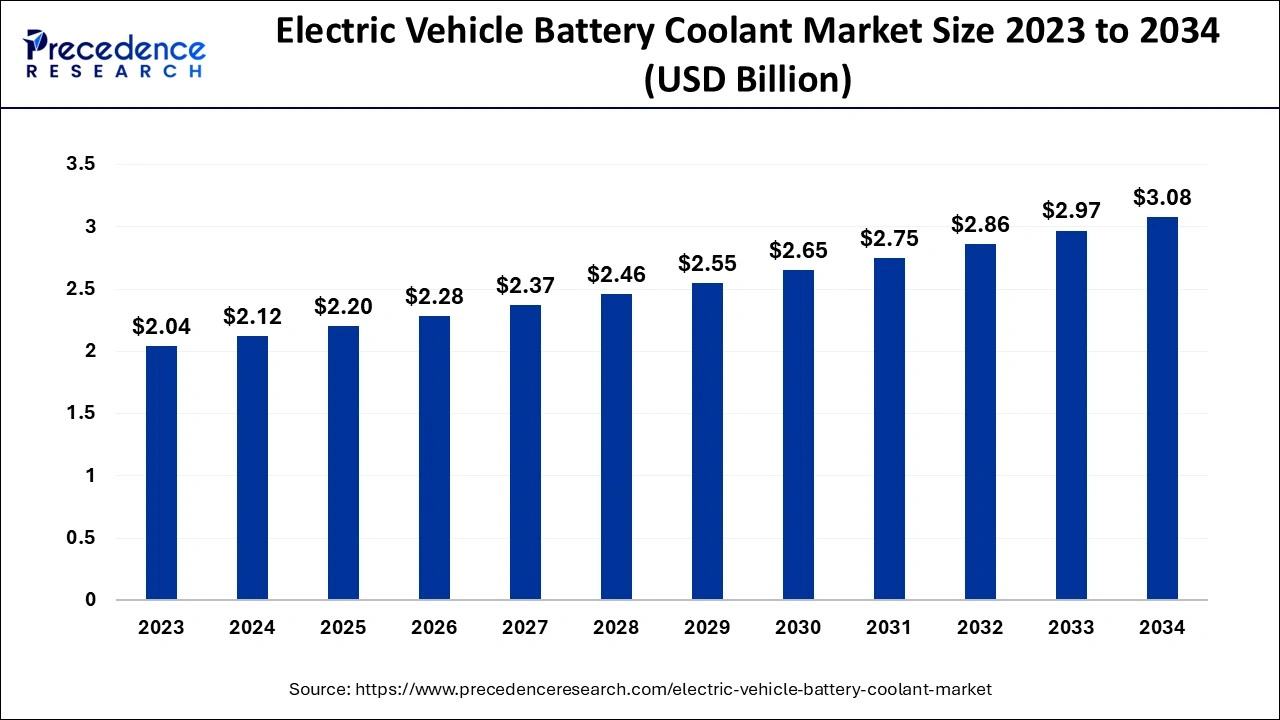
The Asia Pacific electric vehicle battery coolant market size is exhibited at USD 980 million in 2024 and is projected to be worth around USD 1,430 million by 2034, growing at a CAGR of 3.88% from 2024 to 2034.
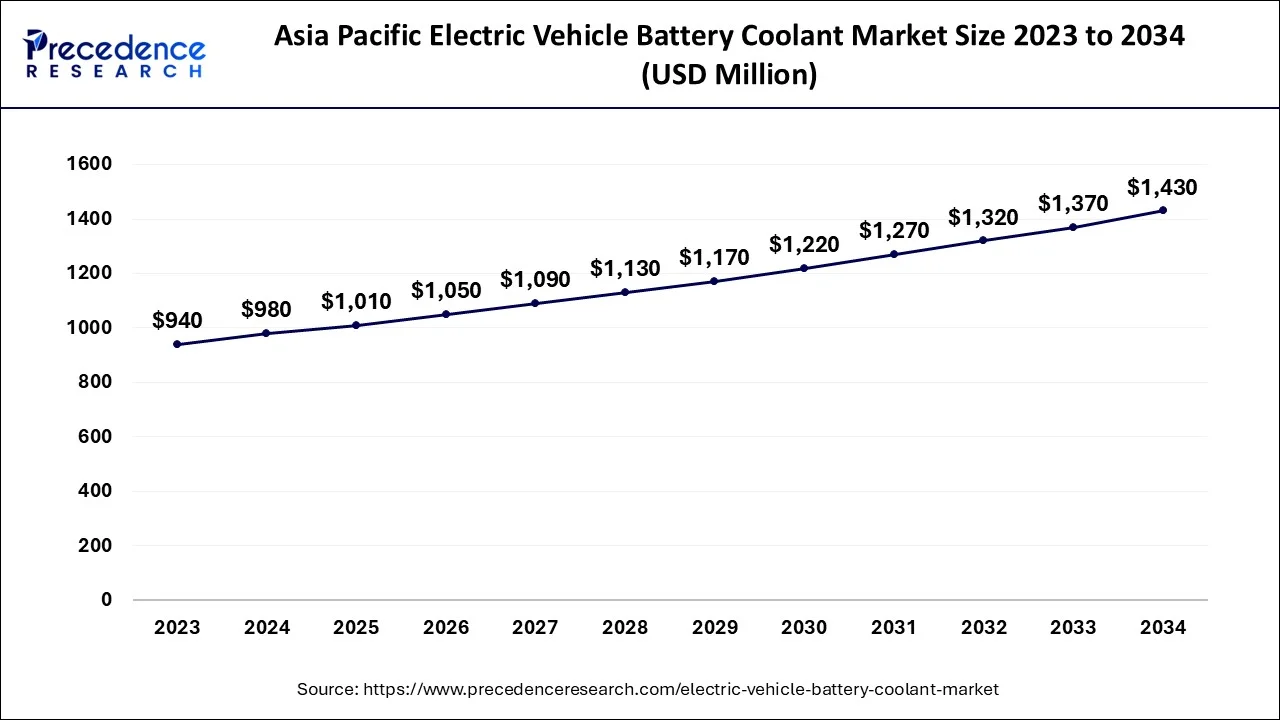
Asia Pacific dominated the global electric vehicle battery coolant market in 2023. The region is growing due to the huge amount of EVs manufactured in leading countries like Japan, China, and India due to the low manufacturing cost and availability of laborers. The Indian government has already announced its plan to develop charging infrastructure for EVs. Moreover, the advanced chemistry battery storage program targets to improve India's battery infrastructure.
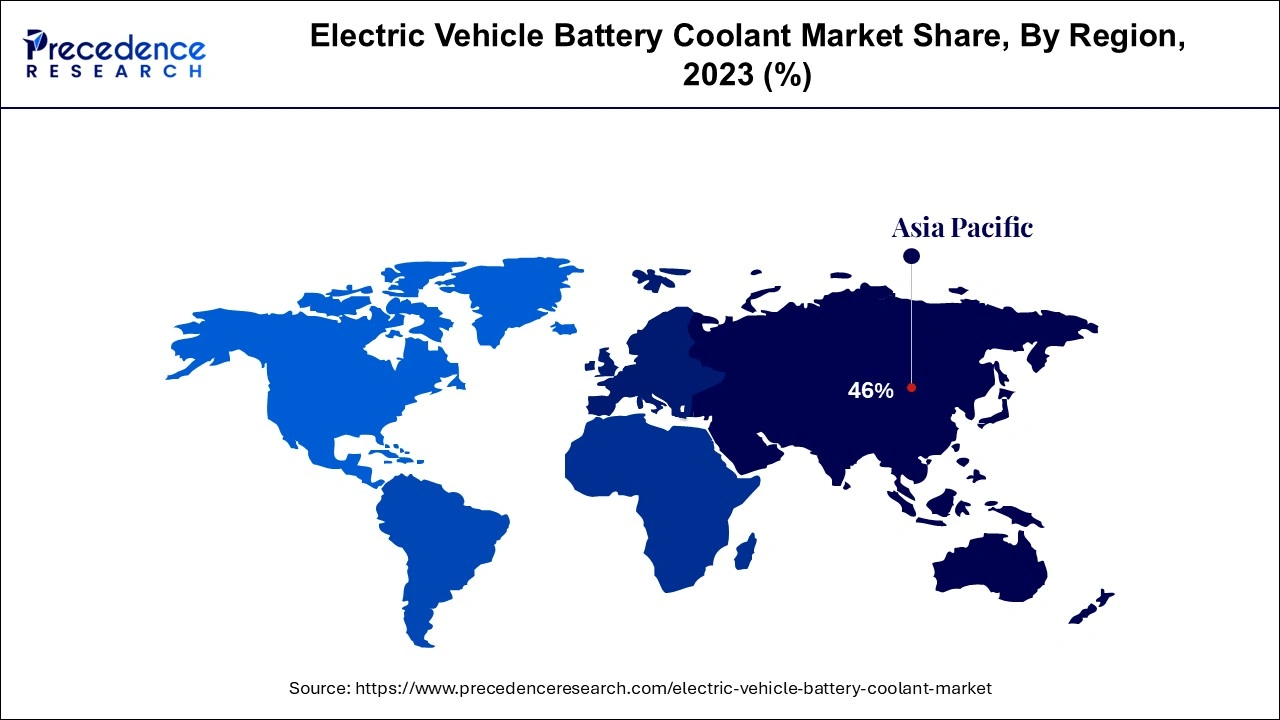
North America is anticipated to witness the fastest growth in the electric vehicle battery coolant market in the forecasted years. Effective usage of coolants to ensure optimum battery performance is the most important aspect of the EV lifecycle. Demand for coolant is therefore increasing due to the EV's stronger adoption in the leading countries like the U.S. and Canada for North America.
The global electric vehicle battery coolant market is expanding due to the increasing concern for the environmental problems like ozone layer depletion and sustainable transportation mode including rising demands for the electric vehicles. Such a surge in the electric vehicles is directly affecting the market on a global scale exponentially which further ensure battery longevity and vehicle efficiency.
As the technology of batteries is witnessing innovations and advancements, there are continuous changes in the energy density of the battery to reduce charging time and enhance overall battery performance. Governments around the globe are also trying to implement stringent regulations for carbon emissions and to increase fuel usage, which is a reusable green energy source and not traditional fuel, which is harmful to the climatic cycle. Hence, many countries have adopted the integration of electric vehicle charging infrastructure with renewable energy sources. Therefore, eventually, the demand for battery coolant for electric vehicles is increasing at a faster pace.
AI impact on the Electric Vehicle Battery Coolant Market
Artificial intelligence (AI) is significantly impacting the electric vehicle battery coolant market by increasing efficiency, sustainability, and performance. Predictive analytics and optimization are the primary ways of impacting the market. AI-based models are used to understand the coolant system performance. These systems can predict and regulate the temperature of the coolant system, which further prevents overheating and helps extend battery life, which is a critical factor in the performance of electric vehicles. AI can also contribute to the advancements of coolant materials by analyzing large datasets on the properties of heat and their interaction with other materials AI can pick the perfect combination material for the coolant structure. The materials that are environmentally friendly can be detected by the AI models.
| Report Coverage | Details |
| Market Size by 2034 | USD 3.08 Billion |
| Market Size in 2024 | USD Billion |
| Market Size in 2025 | USD 2.2 Billion |
| Market Growth Rate from 2024 to 2034 | CAGR of 3.82% |
| Largest Market | Asia Pacific |
| Base Year | 2023 |
| Forecast Period | 2024 to 2034 |
| Segments Covered | Vehicle Type, Battery Type, and Regions |
| Regions Covered | North America, Europe, Asia-Pacific, Latin America and Middle East & Africa |
Increased sales of EVs
The major driving factor for the electric vehicle battery coolant market is the increasing sales of EVs globally. Many electric vehicle manufacturers are launching innovative vehicle models across the major cities in the leading countries.
Moreover, increasing GHG emission and change in the climate have created a challenge for many states in India. The transportation sector has contributed significantly to the emission of GHG. Hence, to reduce this, the entire vehicle fleet must change in terms of emissions.
Compatibility and cost
The major restraining factors for the electric vehicle battery coolant market are the compatibility of the coolant with batteries and cost. Coolant needs to work with various battery materials like seals and metals to avoid corrosion and leaks and keep the system functioning and reliable. Also, the development and manufacturing of the advanced coolant is a complicated and time-consuming, critical process, which again hinders the growth of the market further. Manufacturers should balance cost-effectiveness with quality, including climatic conditions and safety standards set by governments as a guideline.
Development of solid-state batteries
The major opportunity that the electric vehicle battery coolant market holds is the development of next-generation technology like solid-state devices and batteries. The improved battery needs to use specialized coolants that manage the density of the increased energy and thermal loads that create increasing demand for thermal management systems like coolants. Also, the integration of vehicle OEMs to generate customized coolants for specific EVs is increasing the market's demand further. It enables coolant optimum and improves the performance of electric vehicles and battery coolant systems.
The lithium-ion battery segment accounted for the largest share of the electric vehicle battery coolant market in 2023. The growth of this segment is attributed to various factors. Lithium-ion batteries are mostly used in the existing electric vehicles that operate the EVs. The coolant role in this system is critical as batteries generate heat while operating and charging, which needs to be lower with the help of external support like coolant. It might get damaged if heat is not managed properly in the form of reduced efficiency, shorter battery life, and thermal runaway. Hence, the coolant in EVs is made to serve as a heat absorbent.
The lead acid battery segment is anticipated to register significant growth in the electric vehicle battery coolant market during the forecasted years. Lead acid batteries are used for various applications, including conventional ICEs. These batteries generate heat during the charging and discharging cycle; hence, coolant is required to stabilize it. Furthermore, lead acid batteries are cost-effective and relatively inexpensive to produce and maintain. They are also durable and have a high recycling rate, making them environmentally friendly.
The battery electric vehicle segment accounted for the largest share of the electric vehicle battery coolant market. The growth of this segment is due to the reduced emission of carbon-like pollutants, as they do not release harmful chemicals. Battery-operated EVs can be powered by electricity produced from renewable energy sources like solar or wind energy. Also, battery-powered vehicles are more energy efficient, which is the major cause of the segment’s growth.
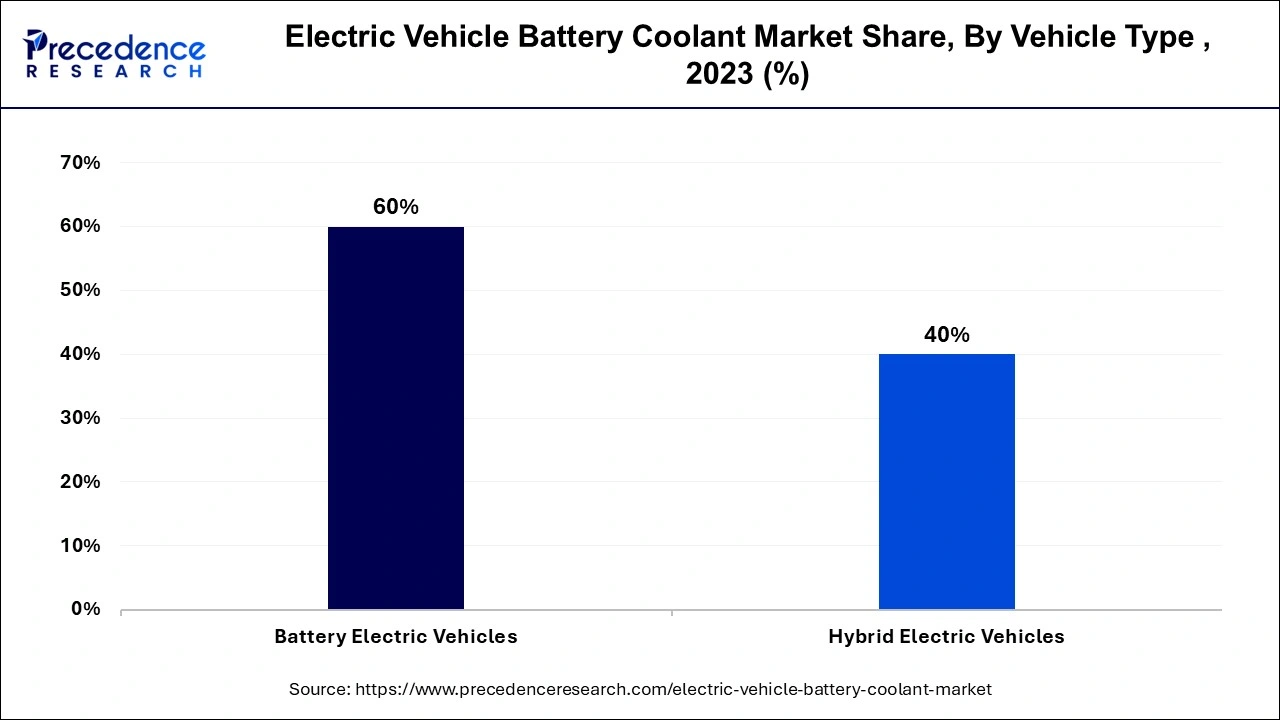
The effective cooling system segment is anticipated to register the fastest growth in the electric vehicle battery coolant market during the forecasted years. The effective cooling system prolongs battery life and offers optimal performance while maintaining the safety features.
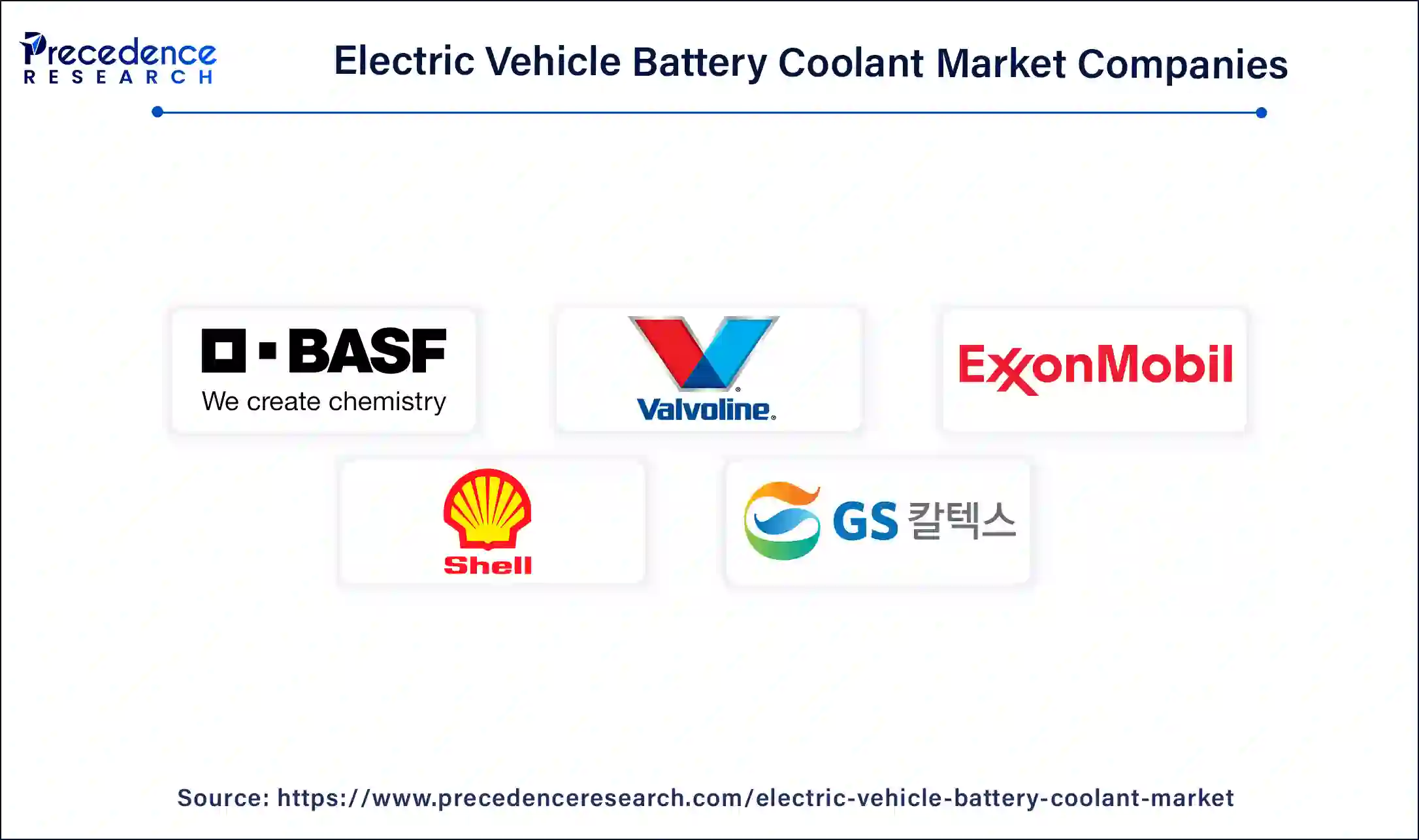
Segments Covered in the Report
By Vehicle Type
By Battery Type
By Geography
For inquiries regarding discounts, bulk purchases, or customization requests, please contact us at sales@precedenceresearch.com
No cookie-cutter, only authentic analysis – take the 1st step to become a Precedence Research client
April 2025
January 2025
January 2025
September 2024